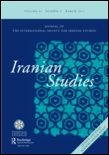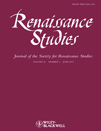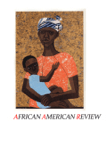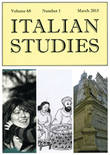
Iranian Studies
metrics 2024
Cultivating Critical Insights into Iranian Studies
Introduction
Iranian Studies is a prestigious academic journal published by Cambridge University Press, focusing on the intricate and diverse aspects of Iranian culture, history, and literature. With an impressive impact factor reflected in its Q1 and Q2 quartile rankings across several categories, including Literature and Literary Theory, History, and Cultural Studies, the journal stands as a vital resource for scholars dedicated to advancing their understanding of Iranian studies. Since its inception in 1967, it has provided a platform for rigorous research and critical discourse, making significant contributions to the fields of Iranian cultural and historical studies. Although the journal is not open access, it ensures quality and rigor in academic publishing, appealing to a wide array of readers, including researchers, professionals, and students seeking authoritative insights. With coverage available until 2024, Iranian Studies remains an essential point of reference and a source of innovative scholarship in the humanities.
Metrics 2024
 0.15
0.15 0.70
0.70 0.60
0.60 25
25Metrics History
Rank 2024
Scopus
IF (Web Of Science)
JCI (Web Of Science)
Quartile History
Similar Journals

Frantsuzskii Ezhegodnik-Annuaire d Etudes Francaises
Connecting Scholars to the Heart of French StudiesFrantsuzskii Ezhegodnik-Annuaire d Etudes Francaises is a distinguished journal dedicated to the study of French culture, literature, and history. Published by the Russian Academy of Sciences, Institute of World History, this journal serves as a critical platform for scholars and researchers in the field of French studies, promoting interdisciplinary dialogue and insightful analysis. Although it currently does not offer Open Access options, it upholds a commitment to rigorous peer review and scholarly excellence. With an ISSN of 0235-4349, the journal aims to foster a deeper understanding of French heritage and its global impacts, making it an invaluable resource for professionals and students alike. The editorial team is dedicated to curating a collection of innovative research that reflects contemporary debates and challenges within the field, establishing the journal as an essential reference point for anyone engaged in French studies.

Balkanistic Forum
Advancing Interdisciplinary Insights into the BalkansBalkanistic Forum, published by Univ Publishing House Neofit Rilski, is a prominent academic journal dedicated to the interdisciplinary study of the Balkan region, encompassing diverse fields including Anthropology, Cultural Studies, History, Linguistics, and Literature and Literary Theory. Established in 2015 and operating out of Bulgaria, this journal aims to promote scholarly dialogue and research that illuminates the complexities and nuances of Balkan societies and cultures. With a commitment to advancing knowledge, it features peer-reviewed articles that not only enrich academic discourse but also encourage the exploration of historical and contemporary issues pertinent to the Balkan area. The journal is classified within the Q2 and Q3 quartiles in various disciplines as of 2023, attesting to its growing influence and contribution within the academic community. Authors and researchers are encouraged to engage with this open-access platform, providing invaluable insights for professionals, students, and scholars interested in the multifaceted dimensions of Balkan studies.

Renaissance Studies
Fostering Interdisciplinary Insights into the RenaissanceRenaissance Studies, published by Wiley, stands as a vital academic platform within the disciplines of Cultural Studies, History, Literature and Literary Theory, Religious Studies, and Visual Arts and Performing Arts. With an impressive history of publication spanning from 1987 to 2024, this journal is recognized in 2023 metrics as a Q2 journal in four categories and Q1 in Literature and Literary Theory, reflecting its substantial impact in promoting interdisciplinary dialogue and research. The journal's robust Scopus rankings further underscore its relevance, including a position in the 83rd percentile in Literature and Literary Theory. Although not an open-access journal, it provides readers and contributors with access to curated, high-quality scholarship that explores the complexities of the Renaissance and its enduring influence on contemporary thought and culture. Researchers, professionals, and students alike will find Renaissance Studies invaluable in fostering discussions that bridge historical context with modern inquiry.

Al-Shajarah
Advancing Scholarly Dialogue in Cultural and Religious StudiesAl-Shajarah is an esteemed academic journal that serves as a vital platform for scholarly discourse in the fields of Cultural Studies, History, Philosophy, and Religious Studies. Published by the International Islamic University Malaysia and the International Institute of Islamic Thought and Civilization, the journal reflects a profound commitment to advancing understanding and dialogue surrounding Islamic thought and its place in modern society. With an ISSN of 1394-6870 and an evolving publication history since its convergence in 2011, Al-Shajarah offers valuable insights that cater to a broad array of readers, from seasoned researchers to emerging academics. The journal's rigorous peer-review process and commitment to cultural and religious scholarship are underscored by its categorization in the Q3 and Q4 quartiles in critical academic fields, and its Scopus rankings demonstrate its relevance within the global academic landscape. While open access is not currently available, Al-Shajarah remains a crucial resource for those seeking to enrich their understanding of Islamic civilizations and philosophy, providing access to pioneering research that shapes the conversation within these disciplines.

PORTUGUESE STUDIES
Exploring the Depths of Portuguese HeritagePORTUGUESE STUDIES is a prominent academic journal published by the Modern Humanities Research Association, dedicated to exploring the rich tapestry of Portuguese culture, history, and literature. With its ISSN 0267-5315 and E-ISSN 2222-4270, the journal has been a vital resource for scholars since its inception in 2002 and continues to contribute valuable insights into the study of Portuguese heritage. Operating from its base in the United Kingdom, the journal encompasses a diverse range of topics that reflect its dynamic scope within Cultural Studies, History, and Literature and Literary Theory. Although currently not categorized as Open Access, the journal's scholarly contributions have attained respectable Scopus rankings, with Q4 and Q3 placements illustrating its growing influence within the academic community. Researchers, professionals, and students alike will find PORTUGUESE STUDIES an indispensable platform for enriching their understanding and discourse on Portuguese affairs, ensuring its crucial role in fostering intellectual engagement and discovery in the humanities.

AFRICAN AMERICAN REVIEW
Unpacking the Layers of African American ExperienceAFRICAN AMERICAN REVIEW, published by the Johns Hopkins University Press, stands as a pivotal journal since its inception, dedicated to exploring the multifaceted aspects of African American literature, culture, and artistic expression. With an ISSN of 1062-4783 and an E-ISSN of 1945-6182, this journal provides a critical platform that delves into the rich tapestry of African American experiences, bridging gaps across literary, cultural, and visual arts disciplines. Its latest impact metrics position it in esteemed quartiles, achieving Q2 rank in both Literature and Literary Theory and Visual Arts and Performing Arts, alongside a strong presence in Cultural Studies with a Q3 classification. The journal’s commitment to high-quality scholarship is reflected in its Scopus rankings, drawing attention from researchers and scholars invested in cultural narratives and historical contexts. Although not currently open access, the journal's comprehensive analyses contribute significantly to discussions in academia and beyond, making it an essential resource for researchers, educators, and students alike looking to deepen their understanding of African American contributions to the arts and humanities.

Expressions maghrebines
Unveiling the Depths of Maghreb Literary TheoryExpressions maghrebines, an esteemed journal published by Florida State University, fosters scholarly dialogue in the realm of Literature and Literary Theory, focusing on the vibrant narratives and critical discourses emerging from the Maghreb region. Established in 2002, this journal has become a vital resource for researchers, professionals, and students, illustrating a commitment to exploring contemporary trends in Francophone literature. With an impressive Q3 rank in 2023, it stands within the top echelon of its category, offering insightful analyses and innovative perspectives to enhance academic understanding. Though not an open-access publication, Expressions maghrebines is indispensable for those seeking to delve into the cultural and intellectual currents that shape Maghreb literary landscapes, thus reinforcing its position as a significant contributor to the academic community's exploration of Francophone studies.

Journal of Persianate Studies
Fostering Scholarly Dialogue on Persianate TraditionsJournal of Persianate Studies, an esteemed publication by BRILL, serves as a vital platform for interdisciplinary research focusing on the rich cultural, historical, and societal dimensions of Persianate societies. Since its inception in 2008, this journal has been pivotal in advancing scholarship within its scope, contributing significantly to the fields of Cultural Studies, History, Sociology, and Political Science. With an impactful tier placement in the 2023 Category Quartiles—Q3 in Cultural Studies, Q2 in History, and Q4 in Sociology and Political Science—it hosts a diverse array of peer-reviewed articles that engage scholars and practitioners alike. The journal has achieved commendable rankings in Scopus, positioning itself within the top 25% for History and top 35% for Social Sciences. While it operates under a traditional access model, its commitment to disseminating critical scholarly work remains unwavering, making it an essential read for researchers and students dedicated to exploring the intricacies of Persianate influences in contemporary contexts.

Transylvanian Review
Unveiling the Past: Insights into Transylvania's Cultural DynamicsTransylvanian Review is an esteemed academic journal published by the CENTER TRANSYLVANIAN STUDIES, focusing on the fields of cultural studies and history. Since its inception in 2008, this journal has been committed to exploring the historical and cultural dynamics of Transylvania and the broader region, contributing to the scholarly discourse on Eastern European studies. Although currently classified in the Q4 quartile of both cultural studies and history in 2023, it serves as a valuable resource for researchers, professionals, and students aiming to deepen their understanding of cultural intersections and historical narratives. With its commitment to interdisciplinary approaches and rigorous scholarship, Transylvanian Review plays an essential role in fostering dialogue and insight within the academic community, and it aims to continue expanding its influence through accessible and impactful articles. Based in Cluj-Napoca, Romania, it enriches the academic landscape with a unique focus on regional studies.

Italian Studies
Illuminating Italy: Where Tradition Meets InnovationItalian Studies, published by Routledge Journals, Taylor & Francis Ltd, stands as a distinguished academic platform in the fields of Cultural Studies, History, Linguistics, Language, Literature, and the Visual Arts. Established in 1937, this journal has fostered scholarly dialogue and innovation through its robust contributions and in-depth analyses that bridge historical and contemporary perspectives on Italian culture. With an impressive ranking in Q2 and Q3 quartiles across multiple categories, including Literature and Literary Theory, and a current impact factor reflecting its growing influence, Italian Studies serves as an essential resource for researchers, professionals, and students alike. Although not an open-access journal, it remains accessible via institutional subscriptions, ensuring that a wide audience can engage with its critically acclaimed research and articles. Located in the UK, Italian Studies continues to advance the understanding of Italy's rich cultural heritage, making it a vital cornerstone for those invested in the humanities and social sciences.